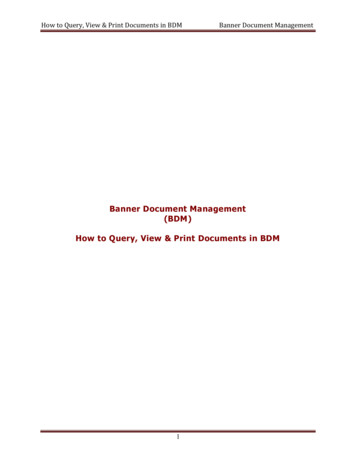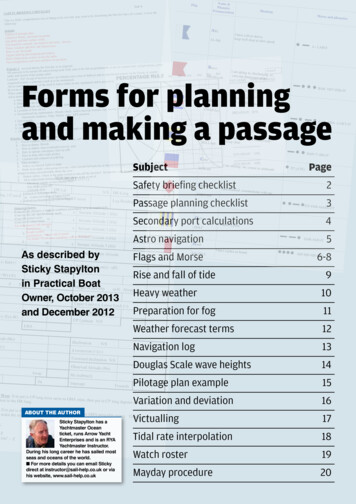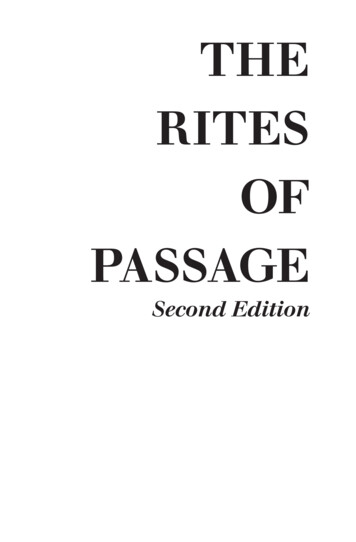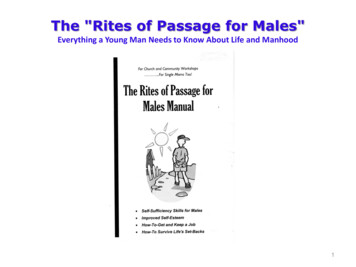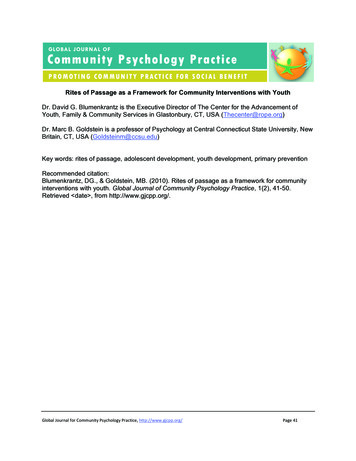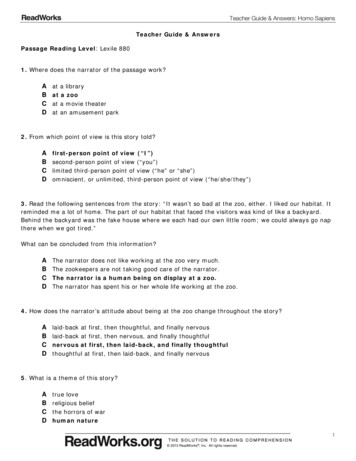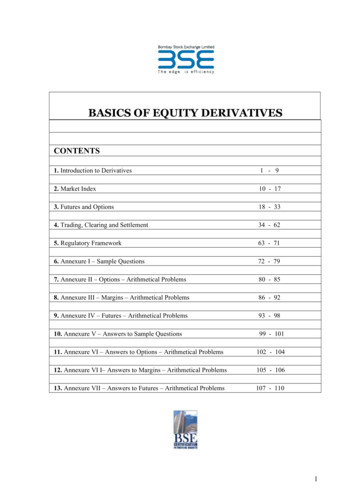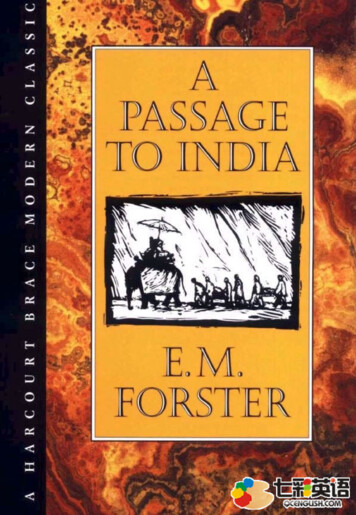
Transcription
A PASSAGE TO INDIABy E.M. ForsterCopyright 1924 by Harcourt, Brace & World, Inc.Copyright 1952 by E. M. ForsterAll rights reserved. No part of this publication may be reproduced or transmitted in any form or by any means,electronic or mechanical, including photocopy, recording, or any information storage and retrieval system,without permission in writing from the publisher. Requests for permission to make copies of any part of thework should be mailed to: Permissions, Harcourt Brace Jovanovich, Publishers, Orlando, FL 32887.ISBN 0-15-671142-7
PART IMOSQUE
CHAPTER IExcept for the Marabar Caves and they are twenty miles off the city of Chandrapore presents nothingextraordinary. Edged rather than washed by the river Ganges, it trails for a couple of miles along the bank,scarcely distinguishable from the rubbish it deposits so freely. There are no bathing-steps on the river front,as the Ganges happens not to be holy here; indeed there is no river front and bazaars shut out the wide andshifting panorama of the stream. The streets are mean, the temples ineffective and though a few fine housesexist they are hidden away in gardens or down alleys whose filth deters all but the invited guest. Chandraporewas never large or beautiful, but two hundred years ago it lay on the road between Upper India, then imperialand the sea and the fine houses date from that period. The zest for decoration neither continued in theeighteenth century, nor was it ever democratic. There is no painting and scarcely any carving in the bazaars.The very wood seems made of mud, the inhabitants of mud moving. So abased, so monotonous is everythingthat meets the eye, that when the Ganges comes down it might be expected to wash the excrescence backinto the soil. Houses do fall, people are drowned and left rotting, but the general outline of the town persists,swelling here, shrinking there, like some low but indestructible form of life.Inland, the prospect alters. There is an oval Maidan and a long sallow hospital. Houses belonging toFurasians stand on the high ground by the railway station. Beyond the railway which runs parallel to the riverthe land sinks, then rises again rather steeply. On the second rise is laid out the little civil station and viewedhence Chandrapore appears to be a totally different place. It is a city of gardens. It is no city, but a forestsparsely scattered with huts. It is a tropical pleasance washed by a noble river. The toddy palms and neemtrees and mangoes and pepul that were hidden behind the bazaars now become visible and in their turn hidethe bazaars. They rise from the gardens where ancient tanks nourish them; they burst out of stifling purlieusand unconsidered temples. Seeking light and air and endowed with more strength than man or his works,they soar above the lower deposit to greet one another with branches and beckoning leaves and to build acity for the birds. Especially after the rains do they screen what passes below, but at all times, even whenscorched or leafless, they glorify the city to the English people who inhabit the rise, so that new-cornerscannot believe it to be as meager as it is described and have to be driven down to acquire disillusionment. Asfor the civil station itself, it provokes no emotion. It charms not; neither does it repel. It is sensibly planned,with a red-brick club on its brow and farther back a grocer's and a cemetery and the bungalows are disposedalong roads that intersect at right angles. It has nothing hideous in it and only the view is beautiful; it sharesnothing with the city except the overarching sky.The sky too has its changes, but they are less marked than those of the vegetation and the river.Clouds map it tip at times, but it is normally a dome of blending tints and the main tint blue. By day the bluewill pale down into white where it touches the white of the land, after sunset it has a new circumferenceorange, melting upwards into tenderest purple. But the core of blue persists and so it is by night. Then thestars hang like lamps from the immense vault. The distance between the vault and them is as nothing to thedistance behind them and that farther distance, though beyond color, last freed itself from blue.The sky settles everything not only climates and seasons but when the earth shall be beautiful. Byherself she can do little only feeble outbursts of flowers. But when the sky chooses, glory can rain into theChandrapore bazaars or a benediction pass from horizon to horizon. The sky can do this because it is sostrong and so enormous. Strength comes from the sun, infused in it daily; size from the prostrate earth. Nomountains infringe on the curve. League after league the earth lies flat, heaves a little, is flat again. Only inthe south, where a group of fists and fingers are thrust up through the soil, is the endless expanse interrupted.These fists and fingers are the Marabar Hills, containing the extraordinary caves.
CHAPTER IIAbandoning his bicycle, which fell before a servant could catch it, the young man sprang up on to theverandah. He was all animation. "Hamidullah, Hamidullah! Am I late?" he cried."Do not apologize," said his host. "You are always late.""Kindly answer my question. Am I late? Has Mehmood Ali eaten all the food? If so I go elsewhere. Mr.Mehmood Ali, how are you?""Thank you, Dr. Aziz, I am dying.""Dying before your dinner? Oh, poor Mehmood Ali!""Hamidullah here is actually dead. He passed away just as you rode up on your bike.""Yes, that is so," said the other. "Imagine us both as addressing you from another and a happierworld.""Does there happen to be such a thing as a hookah in that happier world of yours?""Aziz, don't chatter. We are having a very sad talk."The hookah had been packed too tight, as was usual in his friend's house and bubbled sulkily. Hecoaxed it. Yielding at last, the tobacco jetted up into his lungs and nostrils, driving out the smoke of burningcow dung that had filled them as he rode through the bazaar. It was delicious. He lay in a trance, sensuousbut healthy, through which the talk of the two others did not seem particularly sad they were discussing as towhether or no it is possible to be friends with an Englishman. Mehmood Ali argued that it was not, Hamidullahdisagreed, but with so many reservations that there was no friction between them. Delicious indeed to lie onthe broad verandah with the moon rising in front and the servants preparing dinner behind and no troublehappening."Well, look at my own experience this morning.""I only contend that it is possible in England," replied Hamidullah, who had been to that country longago, before the big rush and had received a cordial welcome at Cambridge."It is impossible here. Aziz! The red-nosed boy has again insulted me in Court. I do not blame him. Hewas told that he ought to insult me. Until lately he was quite a nice boy, but the others have got hold of him.""Yes, they have no chance here, that is my point. They come out intending to be gentlemen and aretold it will not do. Look at Lesley, look at Blakiston, now it is your red-nosed boy and Fielding will go next.Why, I remember when Turton came out first. It was in another part of the Province. You fellows will notbelieve me, but I have driven with Turton in his carriage Turton! Oh yes, we were once quite intimate. He hasshown me his stamp collection.""He would expect you to steal it now. Turton! But red-nosed boy will be far worse than Turton!""I do not think so. They all become exactly the same, not worse, not better. I give any Englishman twoyears, be he Turton or Burton. It is only the difference of a letter. And I give any Englishwoman six months. Allare exactly alike. Do you not agree with me?""I do not," replied Mehmood Ali, entering into the bitter fun and feeling both pain and amusement ateach word that was uttered. "For my own part I find such profound differences among our rulers. Red-nosemumbles, Turton talks distinctly, Mrs. Turton takes bribes, Mrs. Red-nose does not and cannot, because sofar there is no Mrs. Red-nose.""Bribes?""Did you not know that when they were lent to Central India over a Canal Scheme, some Rajah orother gave her a sewing machine in solid gold so that the water should run through his state?""And does it?"No, that is where Mrs. Turton is so skilful. When we poor blacks take bribes, we perform what we arebribed to perform and the law discovers us in consequence. The English take and do nothing. I admire them.""We all admire them. Aziz, please pass me the hookah.""Oh, not yet hookah is so jolly now.""You are a very selfish boy." He raised his voice suddenly and shouted for dinner. Servants shoutedback that it was ready. They meant that they wished it was ready and were so understood, for nobody moved.Then Hamidullah continued, but with changed manner and evident emotion."But take my case the case of young Hugh Bannister. Here is the son of my dear, my dead friends,the Reverend and Mrs. Bannister, whose goodness to me in England I shall never forget or describe. Theywere father and mother to me, I talked to them as I do now. In the vacations their Rectory became my home.They entrusted all their children to me I often carried little Hugh about I took him up to the Funeral of QueenVictoria and held him in my arms above the crowd."
"Queen Victoria was different," murmured Mehmood Ali."I learn now that this boy is in business as a leather merchant at Cawnpore. Imagine how I long tosee him and to pay his fare that this house may be his home. But it is useless. The other Anglo-Indians willhave got hold of him long ago. He will probably think that I want something and I cannot face that from theson of my old friends. Oh, what in this country has gone wrong with everything, Vakil Sahib? I ask you."Aziz joined in. "Why talk about the English? Brrrr.! Why be either friends with the fellows or notfriends? Let us shut them out and be jolly. Queen Victoria and Mrs. Bannister were the only exceptions andthey're dead.""No, no, I do not admit that, I have met others.""So have I," said Mehmood Ali, unexpectedly veering. "All ladies are far from alike." Their mood waschanged and they recalled little kindnesses and courtesies. "She said 'Thank you so much' in the most naturalway." "She offered me a lozenge when the dust irritated my throat." Hamidullah could remember moreimportant examples of angelic ministration, but the other, who only knew Anglo-India, had to ransack hismemory for scraps and it was not surprising that he should return to "But of course all this is exceptional. Theexception does not prove the rule. The average woman is like Mrs. Turton and, Aziz, you know what she is."Aziz did not know, but said he did. He too generalized from his disappointments it is difficult for members of asubject race to do otherwise. Granted the exceptions, he agreed that all Englishwomen are haughty andvenal. The gleam passed from the conversation, whose wintry surface unrolled and expanded interminably.A servant announced dinner. They ignored him. The elder men had reached their eternal politics, Azizdrifted into the garden. The trees smelt sweet green-blossomed champak and scraps of Persian poetry cameinto his head. Dinner, dinner, dinner.but when he returned to the house for it, Mehmood Ali had drifted awayin his turn, to speak to his sais. "Come and see my wife a little then," said Hamidullah and they spent twentyminutes behind the purdah. Hamidullah Begum was a distant aunt of Aziz and the only female relative he hadin Chandrapore and she had much to say to him on this occasion about a family circumcision that had beencelebrated with imperfect pomp. It was difficult to get away, because until they had had their dinner she wouldnot begin hers and consequently prolonged her remarks in case they should suppose she was impatient.Having censured the circumcision, she bethought her of kindred topics and asked Aziz when he was going tobe married.Respectful but irritated, he answered, "Once is enough.""Yes, he has done his duty," said Hamidullah. "Do not tease him so. He carries on his family, twoboys and their sister.""Aunt, they live most comfortably with my wife's mother, where she was living when she died. I cansee them whenever I like. They are such very, very small children.""And he sends them the whole of his salary and lives like a low-grade clerk and tells no one thereason. What more do you require him to do?"But this was not Hamidullah Begum's point and having courteously changed the conversation for afew moments she returned and made it. She said, "What is to become of all our daughters if men refuse tomarry? They will marry beneath them, or " And she began the oft-told tale of a lady of Imperial descent whocould find no husband in the narrow circle where her pride permitted her to mate and had lived on unwed, herage now thirty and would die unwed, for no one would have her now. While the tale was in progress, itconvinced the two men, the tragedy seemed a slur on the whole community; better polygamy almost, thanthat a woman should die without the joys God has intended her to receive. Wedlock, motherhood, power inthe house for what else is she born and how can the man who has denied them to her stand up to face hercreator and his own at the last day? Aziz took his leave saying "Perhaps . . but later . . ." his invariable reply tosuch an appeal."You mustn't put off what you think right," said Hamidullah. "That is why India is in such a plight,because we put off things." But seeing that his young relative looked worried, he added a few soothing wordsand thus wiped out any impression that his wife might have made.During their absence, Mehmood Ali had gone off in his carriage leaving a message that he should beback in five minutes, but they were on no account to wait. They sat down to meat with a distant cousin of thehouse, Mohammed Latif, who lived on Hamidullah's bounty and who occupied the position neither of a
CHAPTER I Except for the Marabar Caves and they are twenty miles off the city of Chandrapore presents nothing extraordinary. Edged rather than washed by the river Ganges, it trails for a

